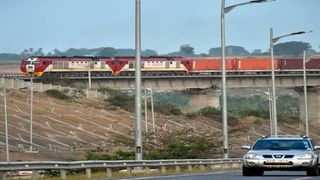
A cargo train leaves for Nairobi via Mombasa's Southern Bypass on February 12, 2021.
| Wachira Mwangi | Nation Media GroupBusiness
Premium
SGR killing cargo truck business
What you need to know:
- The challenge posed by the SGR and operational costs make it harder for logistics firms to survive.
- According to one of the transporters, fuel, whose price has been on the rise, takes up nearly half of the expenses.
A crestfallen Awal Abdi casts a glance at nearly half of his fleet of long-haul cargo trucks, which now lie idle in a yard.
Mr Abdi has been struggling to get more customers to keep his entire fleet on the road.
His firm, Awale Transporters, has 60 trucks, a majority of which have been grounded by stiff competition from the Standard Gauge Railway (SGR).
While his firm charges about Sh80,000 for shipping cargo from Mombasa to Nairobi, the Kenya Railways charges about Sh51,000 ($510) for a 20-foot container and Sh73,000 ($725) for a 40-foot type from Mombasa to the Inland Container Depot (ICD) in Naivasha.
Mr Abdi and other cargo transporters have had to slash their prices to stay in business, a development that has seen several companies lose their trucks to auctioneers after they fell behind in their loan-repayment schedules.
“I have to pay taxes, insurance premiums, service loans and when you add the operational expenses, it is very hard to stay afloat. I have seen a lot of trucks being auctioned because transporters now do not have business, which means the only way for banks to recover their money is to sell the vehicles,” Mr Abdi said.
He added: “When you look at all the costs that are associated with running a fleet of cargo vehicles and the diminishing returns, the sector is becoming less and less lucrative for new players. However, we still retain the small advantage of offering last-mile transportation from the depots to the clients."
Operational costs
Kenya Transporters Association (KTA) CEO Dennis Ombok says the challenge posed by the SGR and operational costs make it harder for logistics firms to survive, especially those that own only a few vehicles.
“If you start out with only a few vehicles, you are basically out of business. You will find that sometimes the cost of doing a trip from Mombasa to Juba is higher than the money you charged, which could drive you out of business if you only rely on a few trucks,” Mr Ombok said.
The CEO says fuel, whose price has been on the rise, takes up nearly half of the expenses. There are also business licence fees, taxes and insurance premiums.
A comprehensive insurance cover costs around 10 per cent of the value of the vehicle per year, with the cost increasing as the fleet ages.
Tyres and moving parts also have to be replaced regularly.
Mr Ombok further explained that as the trucks pass the five weighbridges between Mombasa and Malaba, hefty fines are imposed in case one is found carrying excess weight.
The fines, which are levied by the Kenya National Highways Authority (Kenha), vary depending on the excessive quantity.
“For instance, if you exceed the weight by 7,000kg and it is not your first time to overload, you pay more than Sh200,000. Such risks are inevitable in the business,” he said.
Stuck with idle trucks
Mr Martin Njogu, who has been a truck driver for more than 14 years, says he ferries up to 12 tonnes at full capacity for a single trip.
He knows all the pitfalls investors in freight services walk themselves into and were he to turn to entrepreneurship, he says the transport sector is the last thing he would put his money into.
He has seen a number of acquaintances burn their fingers and face auctioneers.
“This is a really tough sector and many entrants find it hard to survive,” Mr Njogu says.
“For instance, a person hiring a truck to ferry goods to Nanyuki would pay between Sh40,000 to Sh50,000. Yet over Sh20,000 of this cash will go to fuel alone. When you deduct other expenses, the profit margin is very low,” he said.
A new heavy-duty truck costs more than Sh10 million, depending on the model. However, to avoid being stuck with idle trucks – and with financing getting harder to come by – logistics firms are increasingly resorting to leasing to minimise costs.
Vehicle and Equipment Leasing Limited (Vaell) Managing Director Bertha Mvati says she has seen an uptick in leasing orders, with investors preferring the model in order to delegate insurance, tax and maintenance costs to the lessor.
“Investors in the transport sector are increasingly inclining towards leasing to avoid the high outlay costs. It also enables them to avoid absorbing the full burden of depreciation of the vehicles and maintenance costs, which are especially high for commercial vehicles,” Ms Mvati said.





